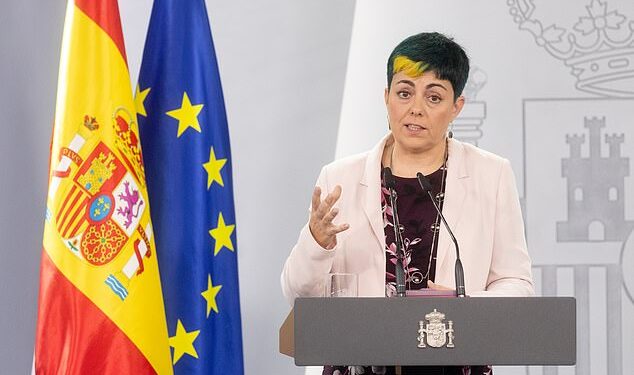Cartoons such as Peppa Pig have been blamed for the lack of women working in construction in Spain.
Spanish MP, Marta Serrano, said the children’s show prevented women from going into jobs including road maintenance because they presented all the workers in these roles as ‘giant, very muscular men’.
The country’s secretary general for land transport argued that cartoons including Peppa Pig and Paw Patrol presented a ‘social and cultural challenge’ because in the shows, ‘those who work fixing the roads are strong men’.
During a conference on the role of women in the transport sector, Serrano said: ‘We are teaching girls that the road sector is not for them and is a man’s thing.
‘It is something that impacts them from a young age and, if they do not have that awareness, it is very difficult for them to choose us in secondary school’.
The politician claimed her own daughter does not believe women can enter the transport industry, even though she sees her mother working on the other side.
‘We are still far from achieving parity,’ Serrano said, adding that just a mere 10 per cent of the road maintenance sector in Spain was made up of women.
In senior positions within the transport sector, women account for just four per cent.

Spanish MP, Marta Serrano, said Peppa Pig was to blame for the lack of women working in construction in Spain

Serrano said the show is ‘teaching girls that the road sector is not for them and is a man’s thing’. Pictured: Far right, Daddy Pig carrying out construction work
The Left-wing politician also criticised her own government department, which she explained had less women than in other public offices.
Serrano, a civil engineer, said: ‘We are falling behind,’ as just 40 per cent of her department are made up of women, compared to the average 54 per cent across government.
To remedy this, Serrano suggested there needed to be ‘more equitable representation across all levels and roles, both in the public and private spheres’.
The Spanish Socialist Workers’ Party (PSOE) politician is set to release a new guide to ‘good practices in gender perspective in land transport infrastructure’ to tackle the low numbers.
Following the statement, a ministry spokesman said: ‘The ministry of transport and sustainable mobility intends for this guide to be a consultation tool for the technical staff of the different public administrations and engineering companies in charge of the design, construction and maintenance of land transport infrastructure.’
But this is not the first time Peppa Pig has come under fire.
American parents branded the cartoon farm animal a ‘brat’ and became furious about the well-known British cartoon that they say has taught their children ‘rudeness and impatience.’
Kayla Tychen, a mother from Houston, said in February: ‘Peppa is rude and impatient, and the show teaches kids that this is who she is and that it’s OK.’

Serrano, said the children’s show prevented women from going into jobs including road maintenance as they presented all the workers in these roles as ‘giant, very muscular men’

The politician claimed her own daughter does not believe women can enter the transport industry, even though she sees her mother working on the other side. Pictured: A young girl watching Peppa Pig
A child behavioural expert also told MailOnline Peppa Pig ‘reinforces unhelpful stereotypes’ about gender roles and ‘isn’t appropriate’ for very young children’.
Sophie Boucher-Giles, who founded Gentle Start Family Consultancy, said she has never had Peppa Pig in her own home and ‘hopefully never will’.
She said the cartoon has a unique ability to draw children in, which can lead to issues at home: ‘There is something about Peppa that is quite addictive.
‘With the huge marketing around it, when you fall into that trap you basically become a Peppa Pig household and you can’t escape.
‘Children then want to see more which can be problematic because Peppa to me reinforces some unhelpful stereotypes and some of the language isn’t nice.’
She added that the introduction of issues such as Peppa and brother George’s frustration towards their parents is not something that should be promoted to the show’s target audience of young, pre-school children.
‘The developmental level isn’t quite appropriate. That [frustration with parents] is a struggle that lots of four and five year old’s have.
She also cited the lack of manners shown in the programme, saying she could ‘count on one hand’ the number of times Peppa says ‘please’ or ‘thank you’.





